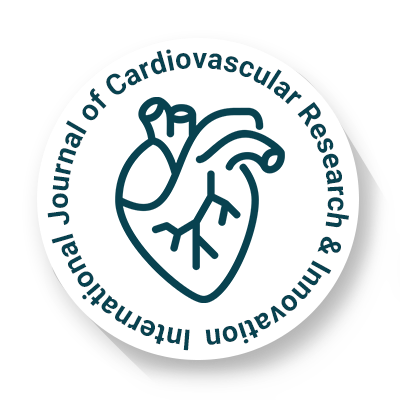
International Journal of Cardiovascular Research & Innovation
OPEN ACCESS

OPEN ACCESS
Cardiovascular diseases (CVDs) are a leading global health concern, responsible for a significant number of deaths each year. Understanding the factors that contribute to these conditions is essential for prevention and effective management. Cardiovascular risk factors encompass a complex interplay of genetic, lifestyle, and environmental influences that predispose individuals to heart disease. By identifying and addressing these factors early, healthcare professionals can enhance patient outcomes and reduce disease prevalence.
One of the most prominent risk factors is hypertension, or high blood pressure, which places excessive strain on the heart and blood vessels. Over time, uncontrolled hypertension can lead to structural damage, increasing the risk of strokes, heart attacks, and heart failure. Adopting a heart-healthy diet, engaging in regular exercise, and adhering to prescribed medications are essential steps in maintaining optimal blood pressure levels.
Dyslipidemia, characterized by imbalances in blood lipid levels, is another key contributor to cardiovascular disease. Elevated levels of low-density lipoprotein (LDL) cholesterol promote plaque buildup in arteries, leading to reduced blood flow and heightened risk of coronary artery disease. Managing cholesterol through dietary modifications, physical activity, and lipid-lowering therapies can significantly mitigate cardiovascular risk.
Diabetes mellitus is strongly associated with an increased likelihood of developing cardiovascular complications. Persistently high blood sugar levels can damage blood vessels and compromise heart function. Effective diabetes management, including blood glucose control, medication adherence, and lifestyle interventions, plays a crucial role in preventing cardiovascular diseases in diabetic individuals.
Obesity, a growing health concern worldwide, contributes to multiple cardiovascular risk factors, including hypertension, insulin resistance, and dyslipidemia. Excessive body weight increases cardiac workload and promotes systemic inflammation, exacerbating the risk of cardiovascular complications. Achieving and maintaining a healthy weight through balanced nutrition and consistent physical activity is integral to reducing this risk.
Lifestyle habits such as smoking and excessive alcohol consumption significantly impact cardiovascular health. Smoking accelerates arterial damage, reduces oxygen supply to the heart, and increases clot formation, elevating the risk of heart attacks and strokes. Similarly, excessive alcohol intake can lead to high blood pressure and cardiomyopathy. Smoking cessation programs and moderate alcohol consumption are essential preventive measures in cardiovascular disease management.
Psychosocial factors, including chronic stress, anxiety, and social isolation, have been increasingly recognized as influential determinants of cardiovascular health. Prolonged stress triggers hormonal imbalances that contribute to high blood pressure and systemic inflammation. Mental well-being, stress reduction techniques, and social engagement can play a crucial role in maintaining heart health.
Genetic predisposition also plays a substantial role in cardiovascular risk. Individuals with a family history of heart disease are more likely to develop similar conditions due to inherited genetic factors. While genetic risks cannot be altered, early screening, preventive strategies, and personalized medical interventions can help mitigate potential complications.
A holistic approach to cardiovascular risk reduction involves a combination of lifestyle modifications, regular health assessments, and adherence to evidence-based treatment guidelines. Public health initiatives focused on early detection, education, and proactive disease management can contribute to reducing the global burden of cardiovascular diseases.
Journals such as the International Journal of Cardiovascular Research & Innovation provide an essential platform for medical professionals, researchers, and clinicians to exchange groundbreaking insights, promote scientific advancements, and contribute to the evolving field of cardiovascular medicine.